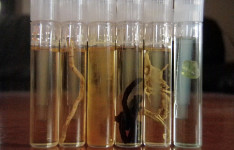Many people don’t know the difference between essential oils and synthetic oils which claim to be essential oils. They may look the same and even smell the same but they lack the medicinal properties that are inherent in essential oils. Essential oils are highly concentrated and are far more potent than these adulterated oils.
Extraction Process
(Source: Essential Oils Desk Reference)
There are several ways to extract oils from plant material. In ancient times enfleurage was used. They would put the petals from roses or jasmine in goose or goat fat and the essential oil molecules were pulled from the petals into the fat. Though this was a primitive method it was effective.
Today steam distillation is used but soaking plant parts in boiling water, soaking them in alcohol, or cold pressing are also other methods used to extract the essence of a plant.
Guidelines for Safe Usage of Essential Oils
- Keep bottles of essential oils tightly closed and stored in a cool location away from light. This will help them retain their potency for many years.
- Keep oils out of the reach of children.
- Keep pure vegetable oil (e.g., olive, almond, etc.) handy when using oils. Vegetable oils can be used to dilute the essential oils if they cause discomfort.
- Keep essential oils away from the eyes as it can cause irritation. (Wash hands before touching your eyes).
- If pregnant consult your doctor before using any essential oils. Be sure to avoid sage, fennel, and hyssop.
- Never add more than 1-3 drops of undiluted essential oils directly into bath water as it can cause irritation. As a general rule never use more than 10 drops of essential oils in one bath.
- Keep essential oils away from open flames, sparks, or electricity.
- Essential oils should not be given as a dietary supplement to children under six years of age.
When using essential oils orally (Young Living Essential Oils) dilute them with vegetable oil, blue agave, or rice milk prior to ingestion. Though many of Young Living Essential Oils can be taken without dilution (like lavender or lemon) others may require dilution. (You can learn more about dilution and dilution amounts by clicking the link).
If you want to learn more about essential oils or order essential oil visit Young Living Essential Oils.
To search for particular oils click on the product line tab to the right and then use the search box at the left side of the page or the alphabet tabs in the middle of the page to locate the oils you need.




Comments on this entry are closed.